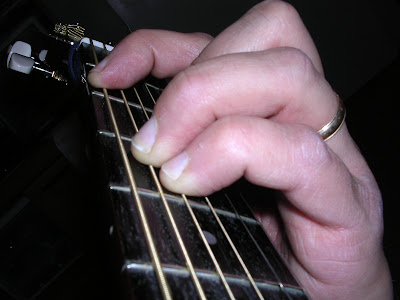Last night I changed the strings on my acoustic guitar. I had been putting it off and putting it off some more, but I knew that I really needed to do it. My strings were pretty much dead-they sounded like
rubberbands! And old
rubberbands at that! The strings I had on it-Martin Marquis's lasted a long time and sounded great for a long time, but they needed to go! Changing the strings gave me a chance to do something with the saddle that I had been wanting to do for a long while also. The action on this guitar was pretty poor especially (as is usually the case) as I neared the 12
th fret. I know that you should have a little bit more space in this area so that the strings will not buzz, but this was ridiculous! I think that this amount of "play" in this area was also affecting the accuracy of the tuning for the notes higher up.
Anyway, I took out the saddle and sanded away, but I was a little hesitant to sand too much, since I didn't have a "backup"! I read up on the 'net on how do this and saw too many horror stories about sanding too much and being out of a saddle-
heh heh-out of the saddle. Well, I put the saddle back in and tuned up, it was still a little too high. The 6
th string pin kept coming out also as I tuned up. More about that later. I
resanded, this time more assured that I needed to take a bit off for this to work, and after I tuned up, what do you know-it was still high!
One last time I sanded this time sure it would be perfect, and it was but I still had a little trouble keeping the pin in for that damn 6
th string. I did get some great information from Justin
Sandercoe,
http://www.justinguitar.com/ www.youtube.com/user/JustinSandercoeSongs?ob=1 who's stuff I have liked on
Youtube about how to restring your acoustic guitar and how to deal with the pins being pulled out. I thought this was some great information. I really like his idea about giving the ball end of the string a little 45 degree angle! Check this out! (Actually, I still had trouble with this 6
th string pin for a while until I was able to get it to wedge in there! I was a little wary of the pin popping out though for a while as I continued to
retune after stretching!)
I liked part two of this little "lesson" about restringing, and I tried to do what Justin says he does in regards to how he inserts the string in the tuning pegs and how he winds the string, etc. I checked out several clips about how one should proceed with the tuning peg thing-some people said insert the string all the way and begin tuning with no slack in the string, and some say leave a little string slack" so that this slack can grab the string that's inserted in the tuning peg hole. (Like Justin's method)I chose to do it like Justin, since it seems like some windings around the tuning peg would help to keep the string in place and in tune. I had just done this before when restringing, just not as "neatly" as Justin does, with my windings going kind of haphazardly around the tuning peg!
My new strings are now beginning to stay in tune. I like to stretch them out somewhat, but I like to just play and do some lead stuff with a lot of bending to get them to stretch rather than stretching so much! Once I get the strings in tune or near pitch, I like to use the harmonic method described here by Jennifer Gamble (I think she was a little nervous on this clip-hell I don't blame her-I would be too!) from
NextLevelGuitar.com
http://www.nextlevelguitar.com/ to tune the strings to
each other.
I have used this method for a long time, and it usually works pretty well for strings that are in good condition and if your intonation is
ok. I don't do the part where she says to tune the B/2
nd string to the B harmonic on the E/6
th, and the E string to the E harmonic on the A string. I just use the B on the 3rd string/4
th fret, to tune the B, playing the G string and the B string together to get a consonant or nice "G chord" sound. I also play the two strings together with the open G and a the C/1st fret and D/3rd fret to see how those sound-hopefully consonant, otherwise the B string may be too sharp or a little flat. The B string on a guitar can sometimes be the most difficult to get just right! It's kinda touchy and if you are off by not too much it can mess up your tuning!
I use the 5
th fret on the B string to tune the E/1st string. I also play the two strings (B and E together) to get consonance. With the G string/C note-B string, G string/D note-B string and the B string/E string played together, what I am looking for is that 5
th chord sound. A kind of "mini power chord" type sound.
So...what I'd like to know is-what method do you use to restring and tune up? Does anybody have some tips about bridge pins in a acoustic guitar? I would like to hear if someone has some different ideas about these things.
Related Tags:
restringing acoustic+guitar Justin+Sandercoe Justin+Guitar.com Nextlevelguitar.com Jennifer+Gamble tuning


















